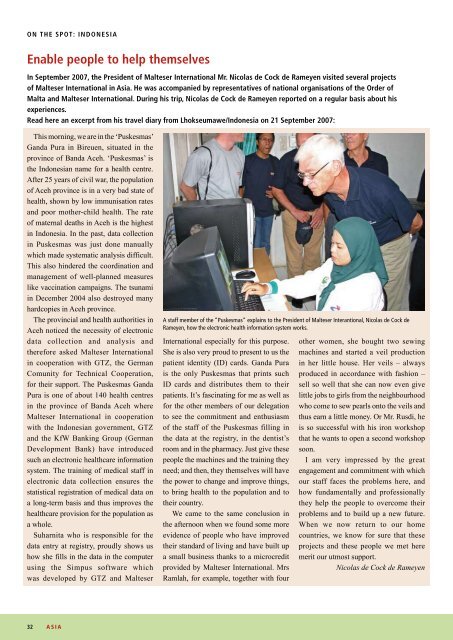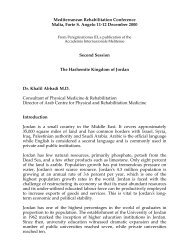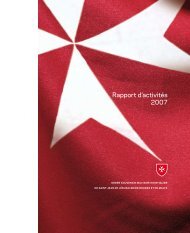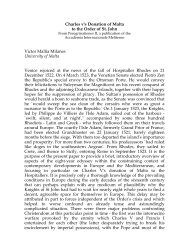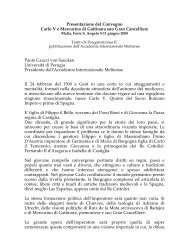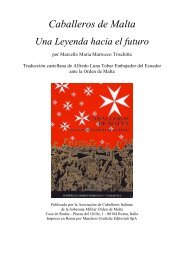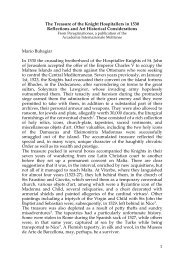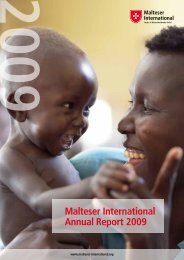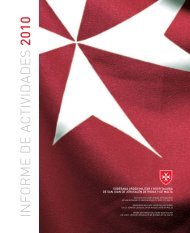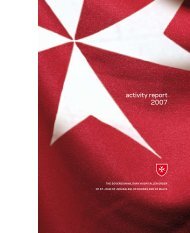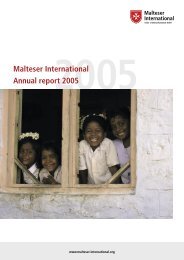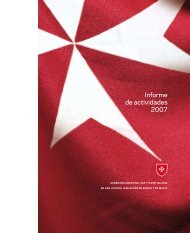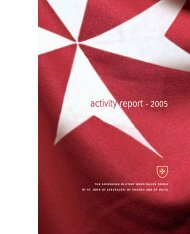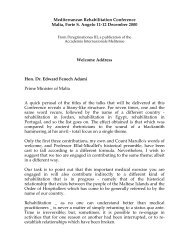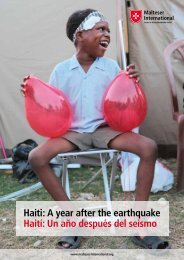Malteser International Annual Report 2007 - Ordine di Malta
Malteser International Annual Report 2007 - Ordine di Malta
Malteser International Annual Report 2007 - Ordine di Malta
You also want an ePaper? Increase the reach of your titles
YUMPU automatically turns print PDFs into web optimized ePapers that Google loves.
On the spot: Indonesia<br />
Enable people to help themselves<br />
In September <strong>2007</strong>, the President of <strong>Malteser</strong> <strong>International</strong> Mr. Nicolas de Cock de Rameyen visited several projects<br />
of <strong>Malteser</strong> <strong>International</strong> in Asia. He was accompanied by representatives of national organisations of the Order of<br />
<strong>Malta</strong> and <strong>Malteser</strong> <strong>International</strong>. During his trip, Nicolas de Cock de Rameyen reported on a regular basis about his<br />
experiences.<br />
Read here an excerpt from his travel <strong>di</strong>ary from Lhokseumawe/Indonesia on 21 September <strong>2007</strong>:<br />
This morning, we are in the ‘Puskesmas’<br />
Ganda Pura in Bireuen, situated in the<br />
province of Banda Aceh. ‘Puskesmas’ is<br />
the Indonesian name for a health centre.<br />
After 25 years of civil war, the population<br />
of Aceh province is in a very bad state of<br />
health, shown by low immunisation rates<br />
and poor mother-child health. The rate<br />
of maternal deaths in Aceh is the highest<br />
in Indonesia. In the past, data collection<br />
in Puskesmas was just done manually<br />
which made systematic analysis <strong>di</strong>fficult.<br />
This also hindered the coor<strong>di</strong>nation and<br />
management of well-planned measures<br />
like vaccination campaigns. The tsunami<br />
in December 2004 also destroyed many<br />
hardcopies in Aceh province.<br />
The provincial and health authorities in<br />
Aceh noticed the necessity of electronic<br />
data collection and analysis and<br />
therefore asked <strong>Malteser</strong> <strong>International</strong><br />
in cooperation with GTZ, the German<br />
Comunity for Technical Cooperation,<br />
for their support. The Puskesmas Ganda<br />
Pura is one of about 140 health centres<br />
in the province of Banda Aceh where<br />
<strong>Malteser</strong> <strong>International</strong> in cooperation<br />
with the Indonesian government, GTZ<br />
and the KfW Banking Group (German<br />
Development Bank) have introduced<br />
such an electronic healthcare information<br />
system. The training of me<strong>di</strong>cal staff in<br />
electronic data collection ensures the<br />
statistical registration of me<strong>di</strong>cal data on<br />
a long-term basis and thus improves the<br />
healthcare provision for the population as<br />
a whole.<br />
Suharnita who is responsible for the<br />
data entry at registry, proudly shows us<br />
how she fills in the data in the computer<br />
using the Simpus software which<br />
was developed by GTZ and <strong>Malteser</strong><br />
A staff member of the “Puskesmas“ explains to the President of <strong>Malteser</strong> Interantional, Nicolas de Cock de<br />
Rameyen, how the electronic health information system works.<br />
<strong>International</strong> especially for this purpose.<br />
She is also very proud to present to us the<br />
patient identity (ID) cards. Ganda Pura<br />
is the only Puskesmas that prints such<br />
ID cards and <strong>di</strong>stributes them to their<br />
patients. It’s fascinating for me as well as<br />
for the other members of our delegation<br />
to see the commitment and enthusiasm<br />
of the staff of the Puskesmas filling in<br />
the data at the registry, in the dentist’s<br />
room and in the pharmacy. Just give these<br />
people the machines and the training they<br />
need; and then, they themselves will have<br />
the power to change and improve things,<br />
to bring health to the population and to<br />
their country.<br />
We came to the same conclusion in<br />
the afternoon when we found some more<br />
evidence of people who have improved<br />
their standard of living and have built up<br />
a small business thanks to a microcre<strong>di</strong>t<br />
provided by <strong>Malteser</strong> <strong>International</strong>. Mrs<br />
Ramlah, for example, together with four<br />
other women, she bought two sewing<br />
machines and started a veil production<br />
in her little house. Her veils – always<br />
produced in accordance with fashion –<br />
sell so well that she can now even give<br />
little jobs to girls from the neighbourhood<br />
who come to sew pearls onto the veils and<br />
thus earn a little money. Or Mr. Rus<strong>di</strong>, he<br />
is so successful with his iron workshop<br />
that he wants to open a second workshop<br />
soon.<br />
I am very impressed by the great<br />
engagement and commitment with which<br />
our staff faces the problems here, and<br />
how fundamentally and professionally<br />
they help the people to overcome their<br />
problems and to build up a new future.<br />
When we now return to our home<br />
countries, we know for sure that these<br />
projects and these people we met here<br />
merit our utmost support.<br />
Nicolas de Cock de Rameyen<br />
32<br />
Asia


